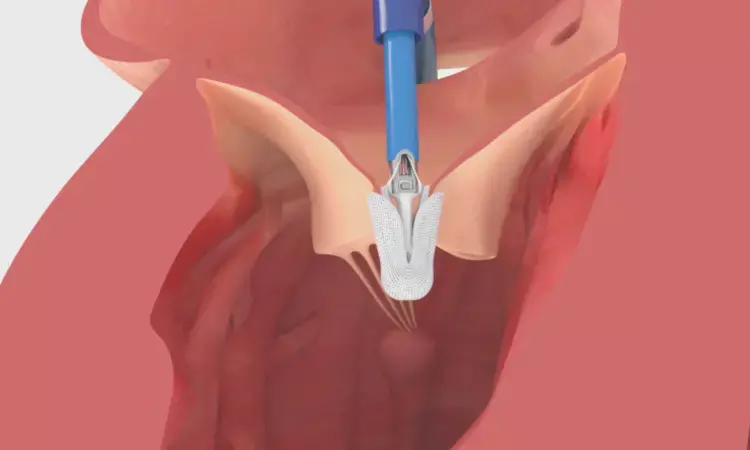- Home
- Medical news & Guidelines
- Anesthesiology
- Cardiology and CTVS
- Critical Care
- Dentistry
- Dermatology
- Diabetes and Endocrinology
- ENT
- Gastroenterology
- Medicine
- Nephrology
- Neurology
- Obstretics-Gynaecology
- Oncology
- Ophthalmology
- Orthopaedics
- Pediatrics-Neonatology
- Psychiatry
- Pulmonology
- Radiology
- Surgery
- Urology
- Laboratory Medicine
- Diet
- Nursing
- Paramedical
- Physiotherapy
- Health news
- Fact Check
- Bone Health Fact Check
- Brain Health Fact Check
- Cancer Related Fact Check
- Child Care Fact Check
- Dental and oral health fact check
- Diabetes and metabolic health fact check
- Diet and Nutrition Fact Check
- Eye and ENT Care Fact Check
- Fitness fact check
- Gut health fact check
- Heart health fact check
- Kidney health fact check
- Medical education fact check
- Men's health fact check
- Respiratory fact check
- Skin and hair care fact check
- Vaccine and Immunization fact check
- Women's health fact check
- AYUSH
- State News
- Andaman and Nicobar Islands
- Andhra Pradesh
- Arunachal Pradesh
- Assam
- Bihar
- Chandigarh
- Chattisgarh
- Dadra and Nagar Haveli
- Daman and Diu
- Delhi
- Goa
- Gujarat
- Haryana
- Himachal Pradesh
- Jammu & Kashmir
- Jharkhand
- Karnataka
- Kerala
- Ladakh
- Lakshadweep
- Madhya Pradesh
- Maharashtra
- Manipur
- Meghalaya
- Mizoram
- Nagaland
- Odisha
- Puducherry
- Punjab
- Rajasthan
- Sikkim
- Tamil Nadu
- Telangana
- Tripura
- Uttar Pradesh
- Uttrakhand
- West Bengal
- Medical Education
- Industry
Transcatheter repair for tricuspid regurgitation improves quality of life

A new study published in The New England Journal of Medicine suggests that tricuspid transcatheter edge-to-edge repair (TEER) improved quality of life, decreased the severity of tricuspid regurgitation, and was safe for individuals with severe tricuspid regurgitation.
Extreme tricuspid regurgitation is a crippling illness that is frequently linked with a low quality of life and significant morbidity. In people with this condition, reducing tricuspid regurgitation may lessen symptoms and enhance therapeutic results. This study was carried out by Paul Sorajja and colleagues to evaluate the effects of minimizing tricuspid regurgitation in patients.
In order to treat severe tricuspid regurgitation, researchers performed a prospective, randomized study of tricuspid transcatheter edge-to-edge repair. TEER or medicinal treatment (control) was randomly allocated to patients with symptomatic severe tricuspid regurgitation at 65 centers in the United States, Canada, and Europe in a 1:1 ratio. The Kansas City Cardiomyopathy Questionnaire (KCCQ) was used to measure quality of life, with an improvement being defined as an increase of at least 15 points in the KCCQ score at the 1-year follow-up. The primary end point was a hierarchical composite that included death from any cause or tricuspid-valve surgery, hospitalization for heart failure, and hospitalization for heart failure. Safety and the degree of tricuspid regurgitation were also evaluated.
The key findings of this study were:
1. 350 patients in all were recruited, with 175 being placed in each group. The patients were 78 years old on average, and 54.9% of them were female.
2. The TEER group was favored by the findings for the main end goal.
3. Hospitalization rates for heart failure and the frequency of mortality or tricuspid-valve operation did not seem to vary between the groups.
4. In the TEER group, the KCCQ quality of life score increased by a mean (SD) of 12.31.8 points compared to 0.61.8 points in the control group.
5. At 30 days, tricuspid regurgitation was mild to moderate in severity in 87.0% of patients in the TEER group and 4.8% of patients in the control group.
6. 98.3% of the patients who received TEER were free of serious adverse effects after 30 days, proving the technique to be safe.
Reference:
Sorajja, P., Whisenant, B., Hamid, N., Naik, H., Makkar, R., Tadros, P., Price, M. J., Singh, G., Fam, N., Kar, S., Schwartz, J. G., Mehta, S., Bae, R., Sekaran, N., Trusty, P. M., … Adams, D. H. (2023). Transcatheter Repair for Patients with Tricuspid Regurgitation. In New England Journal of Medicine (Vol. 388, Issue 20, pp. 1833–1842). Massachusetts Medical Society. https://doi.org/10.1056/nejmoa2300525
Neuroscience Masters graduate
Jacinthlyn Sylvia, a Neuroscience Master's graduate from Chennai has worked extensively in deciphering the neurobiology of cognition and motor control in aging. She also has spread-out exposure to Neurosurgery from her Bachelor’s. She is currently involved in active Neuro-Oncology research. She is an upcoming neuroscientist with a fiery passion for writing. Her news cover at Medical Dialogues feature recent discoveries and updates from the healthcare and biomedical research fields. She can be reached at editorial@medicaldialogues.in
Dr Kamal Kant Kohli-MBBS, DTCD- a chest specialist with more than 30 years of practice and a flair for writing clinical articles, Dr Kamal Kant Kohli joined Medical Dialogues as a Chief Editor of Medical News. Besides writing articles, as an editor, he proofreads and verifies all the medical content published on Medical Dialogues including those coming from journals, studies,medical conferences,guidelines etc. Email: drkohli@medicaldialogues.in. Contact no. 011-43720751


